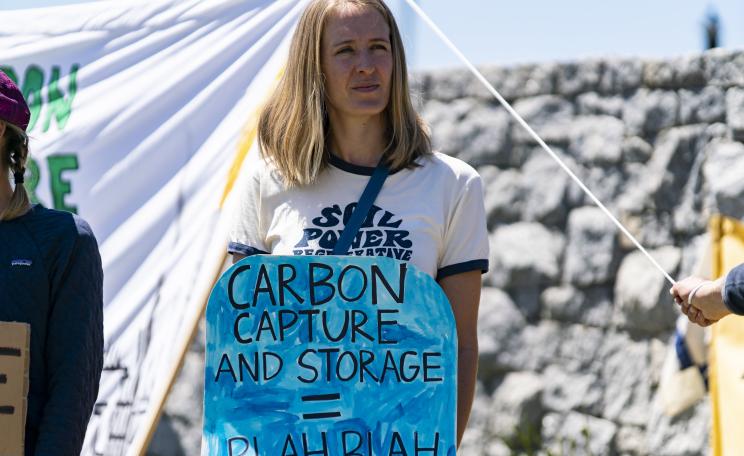We’re living in an age of ‘post’. Post-credit crunch, post-AngloSaxon capitalism, post-unregulated banking sector, post-bonus culture. We’re tightening belts, copies of Das Kapital are flying off the shelves and Asda’s CEO has christened this ‘The Age of Austerity’.
But has anything really changed? For all the talk of Green New Deals, the last budget and welter of global economic stimulus packages suggest that we simply hope to defibrillate our economy back to groggy life and carry on as usual.
So, while business secretary Lord Mandelson is happy to prefix every speech with the words ‘low-carbon’, we are living with national policies that, according to the Environmental Transport Association, could see a punter trade-in a highly efficient VW Lupo (emitting just 81g of CO2 per km) for a monstrous Bentley Arnage (465g CO2 per km), and receive a £1,000 Government sweetener for their trouble.
Equally, while businesses are being hit with progressively tougher carbon taxes, opportunities to improve employees’ quality of life and reduce their environmental impact – e.g. by signing up to the EU Working Time Directive, which limits staff hours – are passed up in favour of a ‘flexible’ labour market.
To breathe the words ‘no growth’ is heresy in a recession, but one group has been brave enough to do so: the Government’s own Sustainable Development Commission, in its report Prosperity Without Growth? It may not be popular, but it is brutally honest about the stark contradictions in our current economic model.
There are plenty of ideas out there for making business and the wider economy sustainable parts of the ecosystem – here are just some.
Green New Deal Group
The green New Deal is an attempt by a number of leading sustainable development luminaries to turn the government’s economic stimulus package into an opportunity to jump-start a green economy. It calls for tighter regulation of banking and finance, massive investment in renewable energy and green jobs, and the breaking-up of large and unwieldy financial institutions. It’s not perfect, but it does have widespread support, and that makes it a powerful idea.
www.greennewdealgroup.org
New Economics Foundation
Independent think-tank NEF has been churning out considered, powerful ideas for developing a sustainable economy since 1986, when it was founded by the leaders of The Other Economic Summit. The driving force behind the Green New Deal (see above), the group publishes annual ‘Accounts of Wellbeing’, offering an alternative indicator to GDP with which to judge world progress. The starting point for any research on alternative economic ideas and systems.
www.neweconomics.org
Green Economics
Not a website, but a book – an extremely comprehensive and well-written book, in fact, by our very own columnist, Molly Scott Cato. Reputedly the only green economist to hold an academic post in the UK, Scott Cato has written widely on sustainable alternatives to the economic orthodoxy. Green Economics is in many ways a compendium of her research.
Published by Earthscan, £19.99
The Institute for Local Self-Reliance
Based in Minneapolis, USA, the ILSR doesn’t specifically focus on economics or finance. Instead, it aims to provide information and strategies on how to encourage local economies that are self-supportive, with policies and businesses designed to meet local or regional needs in a sustainable way.
www.ilsr.org
Systemic Fiscal Reform Group
It hasn’t got the sexiest name in the world, but the SFR Group has made some exciting demands. It calls primarily for a shift of taxation away from income and inheritance and towards resource use and capital assets (especially land ownership). It also proposes abolishing welfare payments and replacing them with a citizen’s income available to all.
www.systemicfiscalreform.org
LETS
Or Local Exchange Trading Systems. Essentially, systems for swapping goods or services without using money. You earn LETS ‘credits’ by providing a service, and can then spend the credits on whatever is offered by others in the scheme – from childcare to tool-hire. Estimates suggest there are around 30,000 people involved in LETS schemes around the UK.
www.letslinkuk.net
Feasta
‘Feasta’ means ‘in the future’ in Irish, but it also roughly stands for the foundation for the Economics of Sustainability, the Dublin think-tank founded in 1998 to ‘explore the economic, cultural and environmental characteristics of a truly sustainable society’. Feasta turns out a lot of good stuff, and attracts writers such as Richard Douthwaite, who wrote the seminal book The Ecology of Money (Green Books, £7).
www.feasta.org
Time banks
Similar to LETS, but measured in time spent, rather than credits, which can vary according to the activity carried out. Somewhat better supported than LETS, time banks usually have a paid member of staff as an administrator and there is specific software to keep track of the flow of ‘time’ in the scheme.
www.timebanking.org
Prosperity Without Growth?
For what is essentially a Government body, the Sustainable Development Commission produces some controversial stuff. It recently put out a groundbreaking report, Prosperity Without Growth?, challenging the idea that economic growth was the way towards a sustainable world. Some brilliant reasoning by leading consumption scholar Professor Tim Jackson makes this a must-read.
Download at http://tinyurl.com/nogrowth
James Robertson
It’s not often we’d recommend the thinking of just one person, but James Robertson deserves that honour. Born in 1928, Robertson became a consultant after a career in government and went on to establish the New Economics Foundation. The author of several books, he still publishes an e-newsletter that promotes a sane, human and ecological alternative to mainstream economics.
www.jamesrobertson.com







